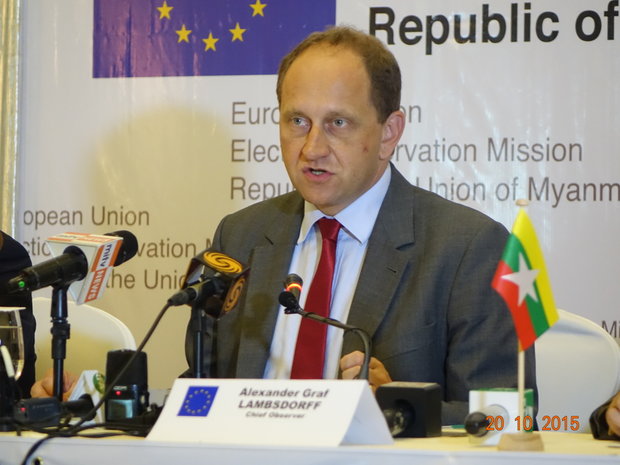Observers from the European Union’s Election Observation Mission on Tuesday refused to call the Burma’s national poll “truly genuine” given the fact that the military commands an automatic 25 percent of seats without being elected, as well as the mass disenfranchisement of Muslim candidates and Rohingya voters.
Speaking from Rangoon’s Sedona Hotel two days after election day, chief of mission Alexander Graf Lambsdorff said that after 150 observers visited more 500 polling stations across the country, he gave the voting procedure a rating of 95 percent, implying that it was “good to very good.”
However, Lambsdorff cautioned that “a truly genuine election” would require the reform of the country’s legal and constitutional framework.
“Internationally, it is clear that for a genuine election, at least one chamber of Parliament must be elected 100 percent of the seats. This of course has not been the case here,” he said, referring to the country’s military, which currently holds an automatic 25 percent of parliament as enshrined by Burma’s 2008 Constitution.
“Another issue of concern is the question of inclusivity,” Lambsdorff added. “We found that the process of candidate nomination and verification of candidacy was applied in a way that has resulted in a very low number of Muslim candidates running.”
Ana Gomes, head of the EU Parliament delegation, reiterated the concern as to mass disenfranchisement, and called on the next government to promote a more inclusive society “by addressing the increase of religious extremism and radicalism and its impact on certain minorities and ethnic groups – in particular Muslim citizens, and specifically the Rohingya.”
Their assessments come a day after state-run daily newspaper The Global New Light of Myanmar ran an announcement from the Ministry of Foreign Affairs declaring that the word “Rohingya” is an “invented terminology.” This statement came in response to a recent report by international NGOs Fortify Rights and International State Crime Initiative highlighting the persecution of the ethnic minority in Arakan State.
The issue of the stateless Rohingya has plagued Burma’s transition towards democracy. Certain groups have taken to calling the Rohingya, “Bengali,” a term that implies that that they are illegal immigrants from Bangladesh. The rise of the hardline Buddhist-nationalist group known as the Ma-Ba-Tha has also put pressure on the opposition National League for Democracy (NLD). The NLD decided put up only one Muslim candidate for the election. That candidate was later disqualified on citizenship grounds.
Calling discrimination against the Rohingya a “social problem”, Lambsdorff highlighted the disenfranchisement of Shwe Maung, a sitting USDP parliamentarian and ethnic Rohingya who was elected to the Hluttaw in 2010. He was denied the right to stand for this year’s election, and the UEC’s list of candidates showed that only 28 Muslims competed.
“Many of their ancestors have been able to vote in previous elections and it is very difficult to understand why they not are not able to stand for election or to vote,” Lambsdorff said. “This has even concerned sitting members of parliament, and in my experience, I’ve never personally encountered that.”
Despite these misgivings, the EU still awarded the voting process a “95 percent” positive grade, saying that the Union Election Commission had done a remarkable job in terms of organisation, ensuring the secrecy of the vote, and allowing access for monitors. They also praised the volunteer teachers and staff of each polling station for their procedural work and transparency.
As for the voter list issues that were widely reported in the media before the election, the EU found that only 7 percent of the polling stations they visited had voters who could not find their names. Lambsdorff did not provide the townships or regions where these problems happened.
Regarding the issue of out-of-constituency advanced voting, he called the counting process a “blackbox” and said that the lack of transparency could affect the trust that the electorate would have in the nationwide poll.
“If you can observe every single aspect of the electorate process, it increases the trust because we don’t have one of these ‘black boxes’ where nobody knows what happened,” he said, adding that he will include the recommendations that out-of-constituency advanced voting be open to observation.
Striking a tone of caution, Lambsdorff said that his findings are preliminary, but not final. “This election is not over yet. As long as counting is going on, and until the final results are published, this election is ongoing,” he said. “Voting has ended; counting is part of the election.”
[related]
After the EU’s Rangoon press conference, the Carter Center, an Atlanta-based organisation that also took part in the election monitoring process, singled out much of the same issues as the EU, and added that there were problems when it came to freedom of expression.
“There are also some constraints on freedom of expression and limitations on peaceful protest and freedom of the press,” said Jason Carter, incoming chairman of the Carter Center’s Board of Trustees.
He added that “hundreds of thousands” of people were unable to take part in this process. “We’ve also observed an anti-Muslim sentiment and race and religion playing a serious role and a negative on in the campaign process.”
Echoing what the EU’s Lambsdorff said, Carter added that there is more to come.
“Both the election process is incomplete, and the country’s transition to democracy is incomplete,” he said.



